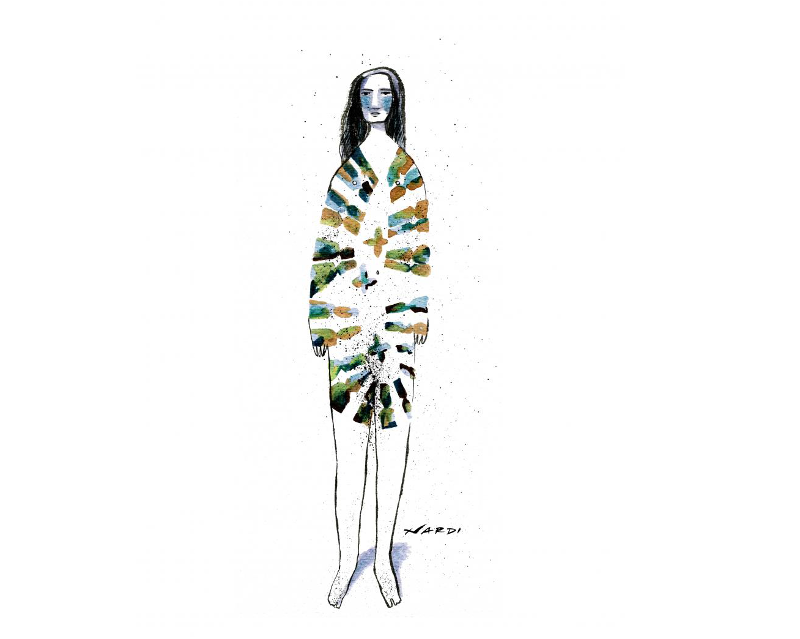Since 1 October 2023, Ukrainian women aged 18-60 working in the medical field have been required to appear before a military commission in order to register for possible service in the army. The summons concerns doctors, nurses, midwives, dentists and pharmacists. Although not all of them will be called up, they must now envisage such a possibility. Exemptions are only available to pregnant women, women on maternity leave, single mothers, mothers of large families, mothers caring for disabled children and wives of Ukrainian military personnel.
Some Ukrainian feminists believe that equality in mobilisation should be taken even further and that women should be conscripted into the army on the same basis as men, as in Israel.
A woman’s duty to serve
According to Hanna Hrycenko, a Ukrainian sociologist at the Gender Research Institute (Інститут Гендерних Програм), "this is a view you can often hear from women fighting in the Ukrainian army". She says that "the 'civilian' feminists are more reticent on this subject. They point out that a country at war not only needs soldiers, but also women to look after children. Not to mention the fact that women play a key role in all kinds of voluntary initiatives."
"Just a few years ago – when the war was confined to the east of the country – Ukrainian feminists were opposed to giving women a greater role in the army, out of pacifism. They changed their minds as soon as missiles started falling on their heads", quips Hrycenko. "It's hard to even hear this kind of opinion today."
Oksana Potapova and Irina Dedusheva are authors of "Five Theses on Feminism and Militarism" in the journal “Gender in Details”. In it, they note that while Western anti-militarism (including its feminist version) is laudable in its intention, it is completely unsuited to the situation in some colonised countries.
War crimes against women
Russian soldiers are putting Ukrainian women through hell. Sexual violence is common, as it was with Red Army troops at the end of the Second World War.
As of August 2023, 208 such cases had been reported to the Ukrainian courts. They included incidents of gang rape, with the use of weapons and in the presence of children. Ukrainian feminist activists consider the true number of victims to be in the thousands, if not tens of thousands, given that victims of sexual assault are often ostracised by society. Children and men are also among them.
What's more, soldiers who return from the trenches are often traumatised by their experiences and more prone to domestic violence. This represents an additional threat to women, especially given that veterans are protected by a degree of social immunity. In 2022, the Ukrainian authorities recorded more than 250,000 complaints about cases of domestic violence.
That same year, Ukraine ratified the Istanbul Convention on tackling violence against women and domestic violence. "This is a great achievement," says Hrycenko. "Nevertheless, we still lack shelters where victims can find refuge."
This spring, Ukrainian social networks were abuzz with discussion about the safety of women on trains. A petition was sent to the national rail operator, calling for the creation of sex-segregated carriages. Finally, the Ukrzaliznytsia railway company decided to introduce separate compartments on night trains. The whole affair gave rise to a talking point that goes something like this: "While men are fighting for their homeland, women are fighting for carriages reserved for them".
The polemic highlights the enormous challenge of reconciling the radically different perspectives of civilian women and all those directly involved in the war effort.
Discrimination suffered by women who serve
Women have been serving in the ranks of the Ukrainian army since the start of the Donbass war in 2014. They were initially employed as care assistants or cooks, because of the conservative laws in force at the time.
Hanna Hrycenko is one of the founders of the Invisible Battalion, an outreach project focusing on women in the Ukrainian military. In 2018 this initiative had a success when a law guaranteeing gender equality in the army came into force.
Today, more than 60,000 women serve in the army, of whom 42,000 are soldiers. On the eve of a war that will involve the whole of Ukrainian society, they represent around 15% of the country's defence forces.
"A few years ago, the standard media coverage consisted of photos of female soldiers putting on make-up in the trenches, or interviews in which they were asked what their husbands thought of their work. Happily, this type of situation is now rare. However, there is still discrimination in certain areas," says Hrycenko.
One example is uniforms. It was only this year that Ukraine's defence ministry approved the female model of the summer uniform (the winter one is still lacking). Since a women’s bullet-proof vest is still in the design phase, women currently wear the men's model, which is not only uncomfortable but also provides less protection for them. Another problem mentioned by Hrycenko is the lack of access to a gynaecologist at the front.
On the other hand, notes Mykhailo Dubyniansky in the Ukrainian newspaper Ukraïnska Pravda, female soldiers enjoy a major "privilege": they are not forced to fight, but join the army of their own free will.
Harassment
According to a study carried out in 2021 by Ukraine's Gender Research Institute, one in ten women serving in the Ukrainian army are victims of harassment. These incidents do not generally take place on the front line but rather in training centres. Cases are rarely brought to light. "In Ukraine, there is no system in place to prevent or tackle sexual violence within the army", sighs Hrycenko. "Women can't even report it anonymously. After identifying this problem we proposed – in collaboration with the Ukrainian NGO Legal Hundred – a number of legal solutions."
Thank you so much for supporting Voxeurop.
If you would like to help us further, consider making a donation or gifting a subscription to someone you know.












